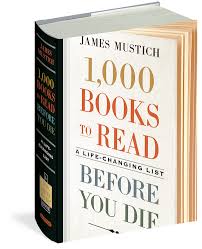James Mustich
Workman Publishing

|
The question of what to read next is the best prelude to even more important ones, like who to be, and how to live…A good book is the opposite of a selfie; the right book at the right time can expand our lives in the way love does, making us more thoughtful, more generous, more brave, more alert to the world’s wonders and more pained by its inequities, more wise, more kind. from 1000 Books to Read Before You Die |
A bucket list for book lovers
I like to think of myself as well-read, and I admit to some smugness as I began leafing through this volume in the bookstore, curious to see how many titles I’d read. Or even partially read—I have yet to meet anyone who’s actually finished Thomas Pynchon’s Gravity’s Rainbow. (Warning: Say you did and I may require a lie-detector test.)
But I was soon surprised, then increasingly alarmed to find so many fascinating books I’d not only not read, but some I’d not even heard of. The Poetics of Space? How had I missed that one? (Cue smugness, fade to humility.)
Imagine having a friend who loves books even more than you do. Witty and erudite, he’s consumed everything from low-brow pulpy page-turners read by literally tens of millions of people to high-brow literary fiction read by literally tens of people. James Mustich is such a person. Bookseller, editor, co-founder of A Common Reader, he includes novels, essays, short stories, poetry, drama, biographies, autobiographies, history, science and science fiction, philosophy, humor (The Decline and Fall of Practically Everybody), from the quirky (Douglas Adams’s The Hitchiker’s Guide to the Galaxy) to the profound (Thomas Merton’s The Seven Storey Mountain,) even books about books (A Reader’s Delight by Noel Perrin.) For book lovers, it’s a literary bucket list.
Reading it, I began to create categories in my mind: BOOKS I MUST READ (Things Fall Apart by Chinua Achebe, The Famished Road by Ben Okri,) BOOKS I STILL MUST READ (This may be the year I finally break down and read Middlemarch,) BOOKS I’VE ALREADY READ BUT NEED TO READ AGAIN—because books speak to us differently at different ages. In junior high school, I first enjoyed Lord of the Flies as an exciting boys’ adventure; when I read it several years later I was surprised that it had become a dark meditation on human nature.
This volume is to savor rather than gulp, the literary equivalent of a menu for book connoisseurs (yes, I know I’m mixing metaphors) causing one’s mind to drool as one reads the offerings, suggesting a feast for the soul. Mustich provides tantalizing descriptions of the works, intriguing anecdotes on authors’ lives, critics’ reviews—and how wrong some were (“so much trash belonging to the worst school of Bedlam literature,” said one critic on Moby Dick’s publication in 1851. In his lifetime, Melville’s reputation never recovered from the novel’s failure.)
Alongside the ethereal “No Man is an Island” and “Death Be Not Proud,” Mustich adds Donne’s “gorgeously frisky love poems.” Annie Dillard’s books (Pilgrim at Tinker Creek, Teaching A Stone to Talk) are “like walks in the woods between covers.” He comments on Theodore Dreiser’s scandalous Sister Carrie (1900,) “What disturbed readers even more than Carrie’s disreputable choices was the fact that Dreiser didn’t make her pay for them.” Generously illustrated, Mustich’s book is a witty, insightful, always fascinating look at literature’s role in humanity’s long and continuing journey toward self-understanding.
Readers may quibble over how a favorite title could have been omitted (I mean, really, a list of Best Books without Boethius’s Consolation of Philosophy?) or Mustich’s preference for one of an author’s books over a reader’s personal favorite (Kazantzakis’s The Greek Way but not The Last Temptation of Christ?)
In my first novel, The Legacy of Emily Hargraves—which amazingly Mustich somehow overlooked—the bibliophile Ashley has a theory that the karmic cycle of being and rebirth is essentially literary in nature: We continue to return to earth to be incarnated again and again until we’ve read all of the world's classics, which hold all the great truths, all the great passions, as well as all the aspirations and collective wisdom of the human race. Reading, Ashley contends, is economical: through books, one can experience many lives, inhabit many worlds, look through different eyes and learn things beyond the pale of any one limited and singular human life. By immersing yourself in Mustich’s book, you realize that you could live less fulfilling ways than by reading these works.
1000 Books to Read Before You Die now sits regally and vertically in a place of honor on my desk. While not a substitute for living, reading can be a guide to it. Get a copy and you will never again need to ask: What is there to read?
This review first appeared in The Columbia River Reader (August 15-September 15, 2019.) Reprinted with permission.



